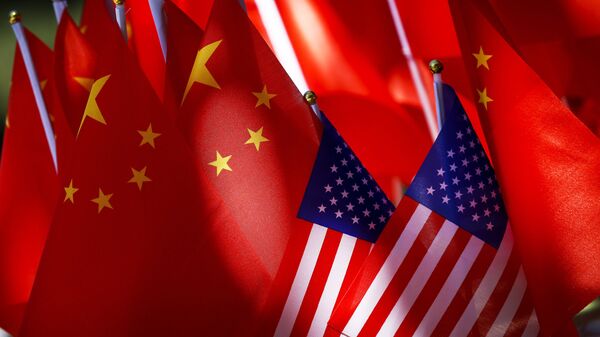Trump-Xi talks are scheduled for the second day of the summit in Osaka, Japan on 29 June. Earlier this week, US trade representative Robert Lighthizer and his counterpart in Beijing, Vice-Premier Liu He, held telephone talks to prepare the groundwork for a meeting between the two heads of state on the G20 sidelines.
Earlier, US Treasury Secretary Steven Mnuchin said that the deal was 90 per cent complete when negotiations between the two sides broke off, but refused to assess the chances of success for this meeting between Trump and Xi.
In his interview with the Fox Business Network, before leaving for Japan, Donald Trump sounded determined. The US president said that China needs this deal more than the United States, and for this reason, he said, Beijing will make concessions. At the same time, Trump stressed that if they fail to achieve a “very good deal,” then there will be no deal at all.
Referring to the billions of dollars the US receives in customs duties, he said he is happy to continue receiving that money.
“My Plan B with China is to take in billions and billions of dollars a month and we’ll do less and less business with them,” Trump told Fox Business.
After his trip to Osaka, Trump may face a dilemma on whether and what kinds of tariffs to impose on the remaining $300 billion of Chinese imports. Trump initially promised a 25 per cent tariff, but also spoke of the possibility of a compromise of 10 per cent.
On the issue of confrontation with China, there is currently unprecedented consensus among Democrats and Republicans, but with differing views on customs tariffs. Foreign policy hawks, like trade adviser Peter Navarro, insist that all Chinese exports should be taxed.
Representatives of business and finance, like Steven Mnuchin, see financial globalisation and trade flows as the basis of their own prosperity and believe tariffs are not the right approach.
Essentially, the tariff war is supported by a very small number of people in Washington, Tu Xinquan, the director of the China Institute for WTO Studies at the University of International Business and Economics, said:
“If you look at the situation inside the United States, then I think that most Americans don't want a trade war. People don't want tariffs on Chinese products, because the income from tariffs is not comparable to the damage to the US economy. Tariffs are viewed as a measure to intimidate China to push it towards resolving problems that exist in relations between the two countries. Therefore, using tariff threats, the United States wants to put pressure on China and force it to accept certain conditions. Trump and his small inner circle are sure that tariffs are a good thing. Trump's words are often inconsistent with his subsequent actions, so we cannot understand the way he thinks,” the professor stated.
Many observers feel Donald Trump does not take into account the limits to the degree of pressure that can be exerted on China. No matter how difficult a trade war would be for China, Beijing will not agree to make certain concessions under any circumstances, according to experts.
First of all, the US demands that China restructures its industrial policy and stops supporting national companies. This is an unconditional requirement for China to remove tariff restrictions, but at the same time to retain the option for the US to introduce tariffs to ensure China’s fulfilment of its obligations. The Chinese side has repeatedly stressed that it does not want a trade war and is ready to make concessions, but only if the American side will take equal steps.
In the last month, leading Chinese media sources, including the People's Daily newspaper, have been sending unequivocal messages to Washington: China does not want a trade war, but it is also not interested in a “bad” deal, so it will fight to the end. There is measured hope that great progress will follow after the upcoming talks between the two leaders. Beijing is already psychologically prepared for further escalation and new trade tariffs from the United States, Tu Xinquan explained:
“Trump has always done this: on the one hand, he spoke about the need to negotiate, on the other hand, he threatened that measures would be taken if the parties could not reach an agreement. But it seems to me personally, that this scheme does not make much sense anymore, because China has already come to terms regarding all Chinese exports being subjected to US tariffs. If they want to introduce new tariffs, then let them. We can't do much about it. Of course, we want to negotiate, we want to solve this problem. But we have already announced our conditions, and if the United States does not want to accept them, we may not reach an agreement. We do not worry too much about this.”
At best, analysts believe it will be possible to prevent a new US tariff hike and reach an agreement on the resumption of bilateral trade talks. If this happens, the United States and the People's Republic of China will undoubtedly face difficult negotiations, since both parties have repeatedly publicly stated their reluctance to making significant concessions.
The views and opinions expressed by the speaker do not necessarily reflect those of Sputnik.

